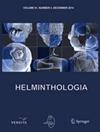Morphological, ultrastructural, and phylogenetic analysis of Ascaridia columbae infecting domestic pigeons (Columba livia domestica)
IF 1.2
4区 生物学
Q4 PARASITOLOGY
引用次数: 0
Abstract
Summary家鸽(Columba livia domestica)蛔虫的形态学、超微结构和系统发育分析
摘要 蛔虫是感染鸽子的最常见线虫。本研究调查了从沙特阿拉伯卡西姆地区的家鸽(Columba livia domestica)身上收集到的线虫寄生虫的具体特征。在 354 只鸽子中,13.3% 感染了线虫寄生虫。研究人员使用传统方法(光学显微镜和扫描电子显微镜)和新引入的分子方法对线虫的形态结构和遗传关系进行了研究。显微镜和超微结构观察结果表明,该线虫属于蛔虫属,并具有大肠蛔虫的所有特征。此外,随机扩增子形态测定(RAPD)PCR分析表明,本品与Ascaridia columbae JX624729的Cox-1基因区相似度高达98.3%,与Ascaridia nymphii LC057210和Ascaridia galli EF180058的ITS1-5.8s-ITS2 rDNA基因区相似度高达98.3%。系统进化分析支持将该 Ascaridia 物种归入 Ascaridiidae 科,与 GenBank 中的其他线虫物种关系密切。最后,我们的研究建议在蠕虫鉴定中使用分子分析作为正确鉴定的主要方法,尤其是在近缘物种中。
本文章由计算机程序翻译,如有差异,请以英文原文为准。
求助全文
约1分钟内获得全文
求助全文
来源期刊

Helminthologia
生物-动物学
CiteScore
1.80
自引率
0.00%
发文量
21
审稿时长
>12 weeks
期刊介绍:
Helminthologia (HELMIN), published continuously since 1959, is the only journal in Europe that encompasses the individual and collaborative efforts of scientists working on a different topics of human, veterinary and plant helminthology. The journal responsibility is to enrich the theoretical and practical knowledge in very specific areas and thus contribute to the advancements in human and veterinary medicine and agronomy. Taking the advantage of comprehensive and multidisciplinary approaches journal still maintains its original spirit and is principal source of fresh scientific information regarding helminths, endoparasites and plant parasites. Addressing the most up-to date topics journal gained rightful and exceptional place next to the other high-quality scientific journals publishing in its field.
 求助内容:
求助内容: 应助结果提醒方式:
应助结果提醒方式:


